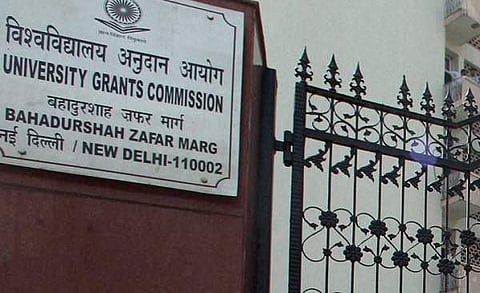

NEW DELHI: Top foreign universities will now be able to set up their campuses in India, with the University Grants Commission (UGC) on Thursday releasing draft regulations for their establishment and operations in the country, under which they will be able to decide their admission process, fees structure and repatriate funds back home.
Making the announcement, UGC Chairman Professor M Jagadesh Kumar said foreign universities can only offer full-time programmes and mandatorily impart education in offline mode as online classes, and distance learning will not be allowed.
"No foreign higher education can set up campuses without the approval of the UGC. Foreign varsities will have to ensure the quality of education imparted at their Indian campuses is on par with their main campus,” he added.
He said universities that participate in global rankings would require a place in the top 500 to apply for setting up campuses in India. But those who are not under such ranking will need to be "highly reputed."
The draft regulations for "Setting up and Operation of Campuses of Foreign Higher Educational Institutions in India", aimed at "providing greater access to our Indian students to high-quality international education in their country," will be notified by Jan-end, after considering all the feedback from all the stakeholders.
The regulatory framework will provide an international dimension to higher education, enable Indian students to obtain foreign qualifications at affordable cost, and make India an attractive global study destination, he added.
While these foreign higher educational institutions (FHEIs) will have the freedom to decide their admission criteria and fee structure, the commission has advised keeping the fees "reasonable and transparent." Prof Kumar also clarified that regulations say they will be free to provide need-based scholarships to students.
The initial approval will be for ten years, and their operations will be renewed in the ninth year, subject to their meeting certain conditions. However, he said the institutions should not offer any such study programme which jeopardises the national interest of India or the standards of higher education in India.
The Foreign Exchange Management Act of 1999 will govern the repatriation of funds and cross-border movement of funds.
He also stressed that UGC would have the right to inspect the campuses at any time, and all domestic laws, like anti-ragging laws, would apply to them too. These foreign universities have also been provided complete autonomy to hire faculty and other staff members from India or abroad.
The UGC will constitute a standing committee to examine matters related to the setting up and operation of campuses of FHEIs in India. The panel will assess each application on merits, including the credibility of the educational institutions, the programmes to be offered, their potential to strengthen educational opportunities in India, and the proposed academic infrastructure, and make recommendations thereof within 45 days.
Initially, UGC will grant in-principle approval and issue a letter of intent to the FHEI to set up campuses in India within two years of approval.
"The new National Education Policy (NEP) 2020 has envisioned that top universities in the world will be facilitated to operate in India. For this, a legislative framework facilitating such entry will be put in place, and such universities will be given special dispensation regarding regulatory, governance, and content norms on par with other autonomous institutions of India," UGC Chairman said.